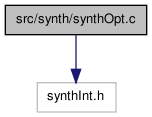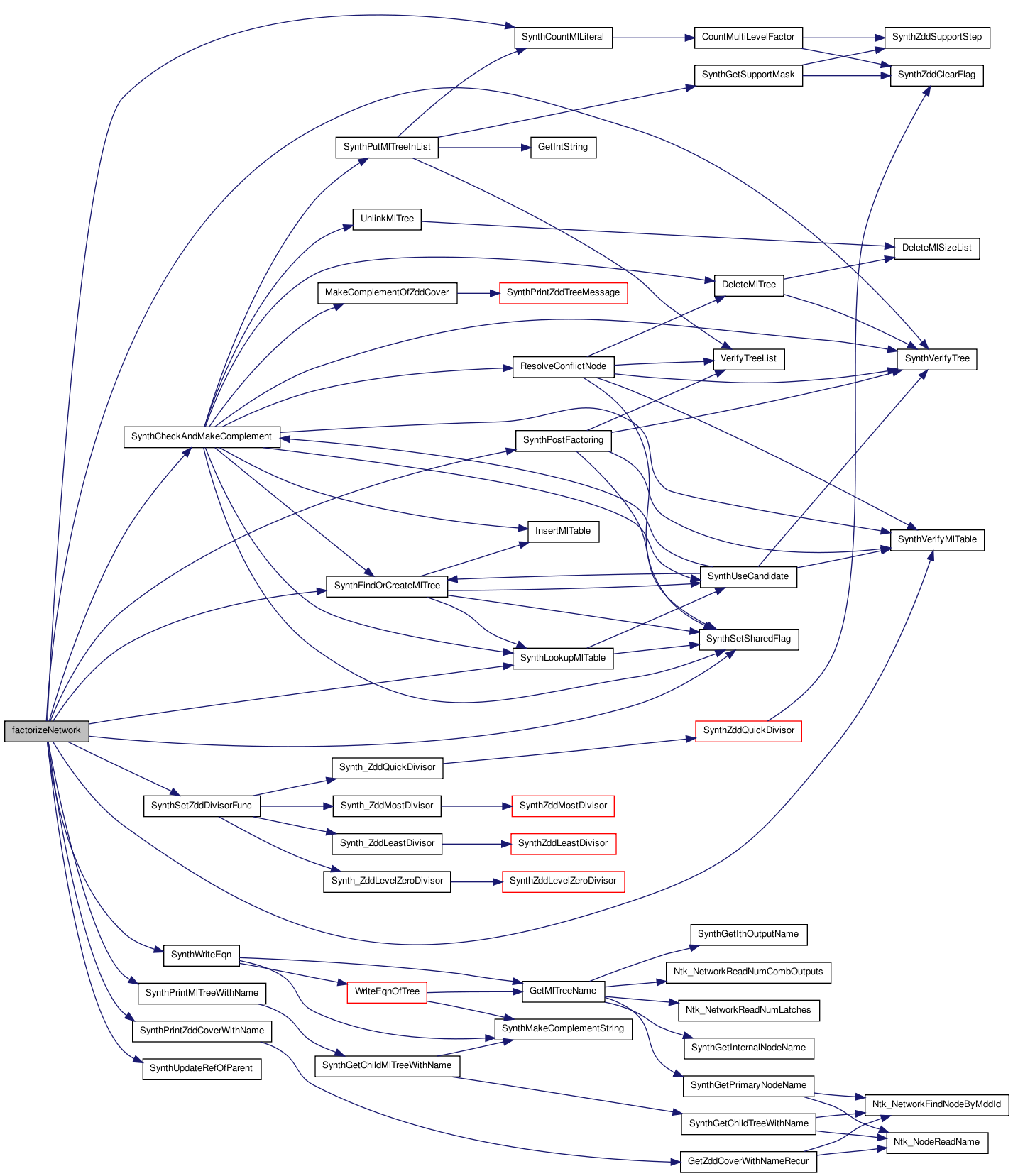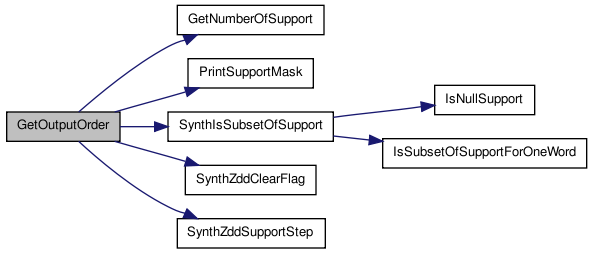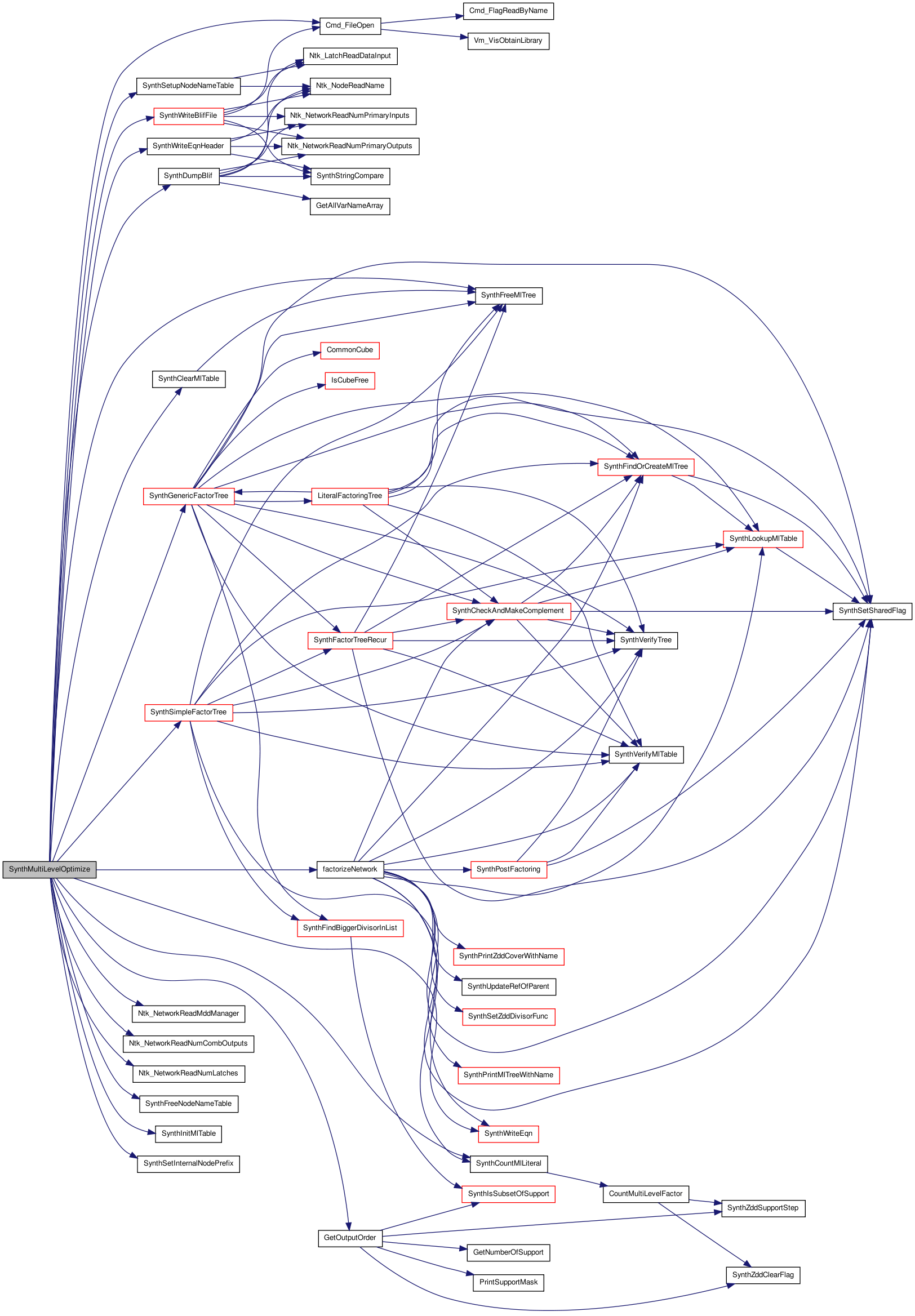#include "synthInt.h" Include dependency graph for synthOpt.c:
Include dependency graph for synthOpt.c:Go to the source code of this file.
Functions | |
| static void | GetOutputOrder (bdd_manager *dd, bdd_node **ofuncs, int no, int *order, int verbosity) |
| static int | IsSubsetOfSupportForOneWord (unsigned int mask1, unsigned int mask2) |
| static int | IsNullSupport (int size, unsigned int *mask) |
| static void | PrintSupportMask (int n, int size, unsigned int *mask) |
| static int | GetNumberOfSupport (int n, int size, unsigned int *mask) |
| static int | factorizeNetwork (Ntk_Network_t *net, bdd_manager *dd, bdd_node **ofuncs, MlTree **tree, int no, int *out_order, st_table *table, char **combOutNames, int divisor, MlTree *(*factoring_func)(bdd_manager *, st_table *, bdd_node *, int, int *, MlTree *, int, MlTree *, int), int verbosity) |
| void | SynthMultiLevelOptimize (Ntk_Network_t *network, bdd_node **combOutBdds, bdd_node **combUpperBdds, char **combOutNames, int *initStates, Synth_InfoData_t *synthInfo, int verbosity) |
| void | SynthSetUseFuncDivisor (int mode) |
| void | SynthSetOutputOrdering (int mode) |
| void | SynthSetCostFactors (float supp, float prob) |
| void | SynthSetSupportCount (int *count) |
| void | SynthSetProbability (float *prob) |
| int | SynthFindDivisorForLowPower (int *count, int nvars, int min_count, int min_pos) |
| char * | SynthGetIthOutputName (int i) |
| int | SynthIsSubsetOfSupport (int size, unsigned int *mask1, unsigned int *mask2) |
Variables | |
| static char rcsid[] | UNUSED = "$Id: synthOpt.c,v 1.53 2005/05/11 20:18:25 hhhan Exp $" |
| int | OutputOrdering = 1 |
| static int | UseFuncDivisor = 1 |
| static float | SuppFactor = 10.0 |
| static float | ProbFactor = 10.0 |
| static int * | SupportCount |
| static float * | Probability |
| static char ** | outputNames |
| int | TryNodeSharing |
| int | noMemoryFlag |
| int | VerifyTreeMode |
Function Documentation
| static int factorizeNetwork | ( | Ntk_Network_t * | net, |
| bdd_manager * | dd, | ||
| bdd_node ** | ofuncs, | ||
| MlTree ** | tree, | ||
| int | no, | ||
| int * | out_order, | ||
| st_table * | table, | ||
| char ** | combOutNames, | ||
| int | divisor, | ||
| MlTree *(*)(bdd_manager *, st_table *, bdd_node *, int, int *, MlTree *, int, MlTree *, int) | factoring_func, | ||
| int | verbosity | ||
| ) | [static] |
Function********************************************************************
Synopsis [Factorizes a network.]
Description [Factorizes a network. If successful, it returns 0, otherwise it returns 1 due to lack of memory.]
SideEffects []
SeeAlso [SynthMultiLevelOptimize]
Definition at line 826 of file synthOpt.c.
{
int i, j, k;
int ref;
int nml;
MlTree *tmp_tree;
int flag;
int comp_flag;
SynthSetZddDivisorFunc(divisor); /* set static variable in synthFactor.c */
for (k = 0; k < no; k++) {
i = out_order[k];
if (!ofuncs[i]) {
tree[i] = NULL;
continue;
}
if (verbosity)
SynthPrintZddCoverWithName(net, dd, ofuncs[i]);
tree[i] = (MlTree *)NULL;
ref = 0;
if (ofuncs[i] == bdd_read_one(dd) || ofuncs[i] == bdd_read_zero(dd)) {
tree[i] = SynthFindOrCreateMlTree(table, dd, ofuncs[i], 1, 0,
&ref, verbosity);
if (!tree[i])
return(1);
} else {
tree[i] = SynthLookupMlTable(table, dd, ofuncs[i], 1, verbosity);
if (tree[i]) {
if (MlTree_IsComplement(tree[i]) || tree[i]->top)
ref = 1;
else
SynthUpdateRefOfParent(tree[i]);
}
else if (UseFuncDivisor) {
/* Try to divide by existing functions. The smaller
* functions are factored first to increase the probability
* of success of this step. Both phases of the divisor are
* tried.
*/
for (j = k - 1; j >= 0; j--) {
tree[i] = (* factoring_func)(dd, table, ofuncs[i], 0, &ref,
tree[out_order[j]], 0, NULL, verbosity);
if (tree[i]) {
SynthSetSharedFlag(dd, tree[out_order[j]]);
break;
} else if (noMemoryFlag == 1)
return(1);
else {
tree[i] = (* factoring_func)(dd, table, ofuncs[i], 0,
&ref, tree[out_order[j]], 1, NULL, verbosity);
if (tree[i]) {
SynthSetSharedFlag(dd, tree[out_order[j]]);
break;
} else if (noMemoryFlag == 1)
return(1);
}
}
}
}
/* Division by other functions did not work. Find a brand-new
* factorization.
*/
if (!tree[i]) {
tree[i] = (* factoring_func)(dd, table, ofuncs[i], 0,
&ref, NULL, 0, NULL, verbosity);
if (!tree[i])
return(1);
}
/* Compute the complement ZDD node of ofuncs[i], if not exist.
* This is to increase sharing.
*/
tmp_tree = tree[i];
tree[i] = SynthCheckAndMakeComplement(dd, table, tree[i], &comp_flag,
verbosity);
if (!tree[i])
return(1);
else if (tree[i] != tmp_tree) {
ref = 1;
if (comp_flag)
tree[i] = MlTree_Not(tree[i]);
}
/* When the tree already exists, create a new tree and copy all
* contents, and set the field 'ref' to 1. This is for the
* purpose of avoiding duplicate literal counting.
*/
if (ref) {
int comp_flag;
comp_flag = 0;
if (MlTree_IsComplement(tree[i])) {
tree[i] = MlTree_Not(tree[i]);
comp_flag = 1;
}
tmp_tree = ALLOC(MlTree, sizeof(MlTree));
memcpy((void *)tmp_tree, (void *)tree[i], sizeof(MlTree));
tree[i] = tmp_tree;
tree[i]->ref = 1;
tree[i]->comp = comp_flag;
}
tree[i]->top = 1;
bdd_ref(tree[i]->node);
nml = SynthCountMlLiteral(dd, tree[i], 1);
if (verbosity) {
SynthPrintMlTreeWithName(net, dd, tree[i], "result : ");
fprintf(vis_stdout, "**** %d (#literal = %d) ****\n", i, nml);
if (verbosity > 1)
SynthWriteEqn(stdout, net, dd, tree[i], ofuncs, combOutNames[i], 1);
}
if (VerifyTreeMode) {
SynthVerifyTree(dd, tree[i], 1);
SynthVerifyMlTable(dd, table);
}
}
flag = SynthPostFactoring(dd, table, factoring_func, verbosity);
if (VerifyTreeMode) {
bdd_node *tmp;
for (i = 0; i < no; i++) {
if (tree[i]->comp)
tmp = tree[i]->complement;
else
tmp = tree[i]->node;
if (tmp != ofuncs[i]) {
(void) fprintf(vis_stdout,
"** synth error: Different zdds in [%s].\n",
combOutNames[i]);
}
SynthVerifyTree(dd, tree[i], 1);
}
}
return(flag);
}
 Here is the call graph for this function:
Here is the call graph for this function: Here is the caller graph for this function:
Here is the caller graph for this function:| static int GetNumberOfSupport | ( | int | n, |
| int | size, | ||
| unsigned int * | mask | ||
| ) | [static] |
Function********************************************************************
Synopsis [Returns the number of support variables of a function.]
Description [Returns the number of support variables of a function.]
SideEffects [none]
SeeAlso []
Definition at line 788 of file synthOpt.c.
{
int i, j, last;
int bit;
int count;
count = 0;
for (i = 0; i < size; i++) {
if (i == (size - 1))
last = n % 32;
else
last = 32;
bit = 01;
for (j = 0; j < last; j++) {
if (mask[i] & bit)
count++;
bit = bit << 1;
}
}
return(count);
}
 Here is the caller graph for this function:
Here is the caller graph for this function:| static void GetOutputOrder | ( | bdd_manager * | dd, |
| bdd_node ** | ofuncs, | ||
| int | no, | ||
| int * | order, | ||
| int | verbosity | ||
| ) | [static] |
AutomaticStart
Function********************************************************************
Synopsis [This function orders the output functions. With this output ordering, the lowest indexed output function is factorized first.]
Description [This function orders the output functions. With this output ordering, the lowest indexed output function is factorized first. If OutputOrder is 0, the output order is just the same as the order VIS has. If OutputOrder is 1, the smallest function (in terms of the number of support variables) will be placed first in the order. In case of tie, the function with the smaller BDD is placed before the other in the order. If OutputOrder is 2, the smallest function in terms of BDD size is first.]
SideEffects []
SeeAlso [SynthMultiLevelOptimize]
Definition at line 525 of file synthOpt.c.
{
int i, j, k, flag;
int *support, *bddsize;
int size;
unsigned int **mask;
int word, sizeZ;
int pos, bit, bit_mask;
int insert_flag, s1, s2;
if (no == 1) {
order[0] = 0;
return;
}
if (OutputOrdering == 0) {
for (i = 0; i < no; i++)
order[i] = i;
return;
}
bddsize = ALLOC(int, no);
if (OutputOrdering == 2) {
for (i = 0; i < no; i++) {
if (!ofuncs[i]) {
order[i] = i;
bddsize[i] = 0;
continue;
}
bddsize[i] = bdd_node_size(ofuncs[i]);
/* Insert i-th output at the right place in the order. */
for (j = 0; j < i; j++) {
if (bddsize[i] < bddsize[order[j]]) {
for (k = i; k > j; k--)
order[k] = order[k - 1];
order[j] = i;
break;
}
}
if (j == i)
order[i] = i;
}
if (verbosity) {
fprintf(vis_stdout, "output order :");
for (i = 0; i < no; i++)
fprintf(vis_stdout, " %d", order[i]);
fprintf(vis_stdout, "\n");
if (verbosity > 1) {
for (i = 0; i < no; i++)
fprintf(vis_stdout, "%d - %d", i, bddsize[i]);
}
}
FREE(bddsize);
return;
}
/* Here OutputOrdering should be 1. */
mask = ALLOC(unsigned int *, no);
sizeZ = bdd_num_zdd_vars(dd);
support = ALLOC(int, sizeZ);
word = sizeof(int) * 8;
size = sizeZ / word + 1;
for (i = 0; i < no; i++) {
if (!ofuncs[i]) {
mask[i] = (unsigned int *)NULL;
order[i] = i;
bddsize[i] = 0;
continue;
}
mask[i] = ALLOC(unsigned int, size);
(void)memset((void *)mask[i], 0, size * sizeof(int));
(void)memset((void *)support, 0, sizeof(int) * sizeZ);
SynthZddSupportStep(bdd_regular(ofuncs[i]), support);
SynthZddClearFlag(bdd_regular(ofuncs[i]));
/* Pack the support array into a bit vector. */
for (j = 0; j < sizeZ; j++) {
if (support[j]) {
pos = j / word;
bit = j % word;
bit_mask = 01 << bit;
mask[i][pos] |= bit_mask;
}
}
bddsize[i] = bdd_node_size(ofuncs[i]);
for (j = 0; j < i; j++) {
insert_flag = 0;
flag = SynthIsSubsetOfSupport(size, mask[i], mask[order[j]]);
if (flag == 1)
insert_flag = 1;
else if (flag == 2) {
s1 = GetNumberOfSupport(sizeZ, size, mask[i]);
s2 = GetNumberOfSupport(sizeZ, size, mask[order[j]]);
if (s1 < s2 || (s1 == s2 && bddsize[i] < bddsize[order[j]]))
insert_flag = 1;
}
if (insert_flag) {
for (k = i; k > j; k--)
order[k] = order[k - 1];
order[j] = i;
break;
}
}
if (j == i)
order[i] = i;
}
FREE(support);
FREE(bddsize);
if (verbosity) {
fprintf(vis_stdout, "output order :");
for (i = 0; i < no; i++)
fprintf(vis_stdout, " %d", order[i]);
fprintf(vis_stdout, "\n");
if (verbosity > 1) {
for (i = 0; i < no; i++) {
if (mask[i])
PrintSupportMask(sizeZ, size, mask[i]);
}
}
}
for (i = 0; i < no; i++) {
if (mask[i])
FREE(mask[i]);
}
FREE(mask);
}
 Here is the call graph for this function:
Here is the call graph for this function: Here is the caller graph for this function:
Here is the caller graph for this function:| static int IsNullSupport | ( | int | size, |
| unsigned int * | mask | ||
| ) | [static] |
Function********************************************************************
Synopsis [Checks if a support set is empty.]
Description [Checks if a support set is empty.]
SideEffects []
SeeAlso []
Definition at line 709 of file synthOpt.c.
{
int i;
for (i = 0; i < size; i++) {
if (mask[i] != 0)
return(0);
}
return(1);
}
 Here is the caller graph for this function:
Here is the caller graph for this function:| static int IsSubsetOfSupportForOneWord | ( | unsigned int | mask1, |
| unsigned int | mask2 | ||
| ) | [static] |
Function********************************************************************
Synopsis [Checks whether a set of support for one word is subset of the other set of support for one word.]
Description [Checks whether a set of support for one word is subset of the other set of support for one word. SynthIsSubsetOfSupport() calls this function for each word.]
SideEffects []
SeeAlso [SynthIsSubsetOfSupport]
Definition at line 682 of file synthOpt.c.
{
unsigned int tmp;
if (mask1 == mask2)
return(2);
tmp = mask1 | mask2;
if (tmp != mask2)
return(0);
return(1);
}
 Here is the caller graph for this function:
Here is the caller graph for this function:| static void PrintSupportMask | ( | int | n, |
| int | size, | ||
| unsigned int * | mask | ||
| ) | [static] |
Function********************************************************************
Synopsis [Prints the support of a function.]
Description [Prints the support of a function. The argument n is the number of variables and size is the number of word and mask is the array of support mask. The first line shows column index by modulo 10 and the next line shows which variables are support by printing 1.]
SideEffects []
SeeAlso []
Definition at line 737 of file synthOpt.c.
{
int i, j, pos, last;
char *support;
char *mark;
int bit;
support = ALLOC(char,n);
mark = ALLOC(char,n);
pos = 0;
for (i = 0; i < size; i++) {
if (i == (size - 1))
last = n % 32;
else
last = 32;
bit = 01;
for (j = 0; j < last; j++) {
sprintf(&mark[pos], "%d", pos % 10);
if (mask[i] & bit)
support[pos] = '1';
else
support[pos] = '0';
pos++;
bit = bit << 1;
}
}
mark[pos] = support[pos] = '\0';
fprintf(vis_stdout, "%s\n", mark);
fprintf(vis_stdout, "%s\n", support);
FREE(support);
FREE(mark);
}
 Here is the caller graph for this function:
Here is the caller graph for this function:| int SynthFindDivisorForLowPower | ( | int * | count, |
| int | nvars, | ||
| int | min_count, | ||
| int | min_pos | ||
| ) |
Function********************************************************************
Synopsis [Finds a good divisor for low power.]
Description [Finds a good divisor for low power.]
SideEffects []
SeeAlso []
Definition at line 397 of file synthOpt.c.
{
int i, v;
float cost, best;
if ((!SupportCount) || (!Probability))
return(-1);
v = min_pos;
if (SuppFactor == 0.0 && ProbFactor == 0.0)
best = (float)SupportCount[min_pos] * Probability[min_pos];
else {
best = (float)SupportCount[min_pos] * SuppFactor +
Probability[min_pos] * ProbFactor;
}
for (i = min_pos + 1; i < nvars; i++) {
if (count[i] == min_count) {
if (SuppFactor == 0.0 && ProbFactor == 0.0)
cost = (float)SupportCount[i] * Probability[i];
else {
cost = (float)SupportCount[i] * SuppFactor +
Probability[i] * ProbFactor;
}
if (cost > best) {
best = cost;
v = i;
}
}
}
return(v);
}
 Here is the caller graph for this function:
Here is the caller graph for this function:| char* SynthGetIthOutputName | ( | int | i | ) |
Function********************************************************************
Synopsis [Returns the i-th output name.]
Description [Returns the i-th output name.]
SideEffects []
SeeAlso []
Definition at line 447 of file synthOpt.c.
{
return outputNames[i];
}
 Here is the caller graph for this function:
Here is the caller graph for this function:| int SynthIsSubsetOfSupport | ( | int | size, |
| unsigned int * | mask1, | ||
| unsigned int * | mask2 | ||
| ) |
Function********************************************************************
Synopsis [Checks whether one support set is a subset of the other support set.]
Description [Checks whether one support set is a subset of the other support set. A support set is represented by a bit-vector. If the index 0 variable of a unique table is in the support of a function, then the MSB bit is set to 1. In general, for the variable of index i, the i-th bit from the MSB is set to 1. The argument size means the number of words (word = sizeof(int)). If the sets are the same, SynthIsSubsetOfSupport returns 2. If the first set is a subset of the second, it returns 1, otherwise it returns 0.]
SideEffects []
SeeAlso [IsSubsetOfSupportForOneWord IsNullSupport]
Definition at line 473 of file synthOpt.c.
{
int i, tmp, flag = 0;
if (!mask2)
return(1);
if (IsNullSupport(size, mask1) && IsNullSupport(size, mask2))
return(0);
else if (IsNullSupport(size, mask1))
return(0);
else if (IsNullSupport(size, mask2))
return(1);
for (i = 0; i < size; i++) {
tmp = IsSubsetOfSupportForOneWord(mask1[i], mask2[i]);
if (tmp == 0)
return(0);
flag |= tmp;
}
return(flag);
}
 Here is the call graph for this function:
Here is the call graph for this function: Here is the caller graph for this function:
Here is the caller graph for this function:| void SynthMultiLevelOptimize | ( | Ntk_Network_t * | network, |
| bdd_node ** | combOutBdds, | ||
| bdd_node ** | combUpperBdds, | ||
| char ** | combOutNames, | ||
| int * | initStates, | ||
| Synth_InfoData_t * | synthInfo, | ||
| int | verbosity | ||
| ) |
AutomaticEnd Function********************************************************************
Synopsis [Optimizes a network by factorizing.]
Description [Optimizes a network by factorizing.]
SideEffects []
SeeAlso []
Definition at line 94 of file synthOpt.c.
{
bdd_manager *dd = (bdd_manager *)Ntk_NetworkReadMddManager(network);
bdd_node *top;
bdd_node **ofuncs;
int i, no;
int factoring, divisor;
char *filename;
char *filehead;
MlTree **tree;
bdd_node *zdd_I;
st_table *table;
int nml, tml;
int *out_order;
FILE *feqn;
MlTree *(* factoring_func)(bdd_manager *, st_table *,
bdd_node *, int, int *, MlTree *,
int, MlTree *, int);
int autoDyn, autoDynZ;
bdd_reorder_type_t method, methodZ;
int error;
factoring = synthInfo->factoring;
divisor = synthInfo->divisor;
filehead = synthInfo->filehead;
TryNodeSharing = synthInfo->trySharing;
SynthSetInternalNodePrefix(synthInfo->prefix);
/* Save reordering status and set reordering mode specific to
* synthesis.
*/
autoDyn = bdd_reordering_status(dd, &method);
autoDynZ = bdd_reordering_zdd_status(dd, &methodZ);
switch (synthInfo->reordering) {
case 0 :
bdd_dynamic_reordering_disable(dd);
bdd_dynamic_reordering_zdd_disable(dd);
break;
case 1 :
bdd_dynamic_reordering(dd, method, BDD_REORDER_VERBOSITY_DEFAULT);
bdd_dynamic_reordering_zdd_disable(dd);
break;
case 2 :
bdd_dynamic_reordering_disable(dd);
bdd_dynamic_reordering_zdd(dd, methodZ, BDD_REORDER_VERBOSITY_DEFAULT);
break;
case 3 :
bdd_dynamic_reordering(dd, method, BDD_REORDER_VERBOSITY_DEFAULT);
bdd_dynamic_reordering_zdd(dd, methodZ, BDD_REORDER_VERBOSITY_DEFAULT);
break;
default :
bdd_dynamic_reordering_disable(dd);
bdd_dynamic_reordering_zdd_disable(dd);
break;
}
if (factoring == 0)
factoring_func = SynthSimpleFactorTree;
else
factoring_func = SynthGenericFactorTree;
/* outputNames is a static global variable for this file. */
outputNames = combOutNames;
/* Initialize the node-tree table and other factoring-related variables.
* The table contains pairs of a ZDD node and the corresponding multi-level
* tree.
*/
table = st_init_table(st_ptrcmp, st_ptrhash);
SynthInitMlTable();
/* Create ZDD variables for the positive and negative literals. */
bdd_zdd_vars_from_bdd_vars(dd, 2);
/* Since we currently support only blif files, the number of
* functions to synthesize should not include the initial
* inputs of latches in case of sequential ckts.
*/
no = Ntk_NetworkReadNumCombOutputs(network) -
Ntk_NetworkReadNumLatches(network);
/* Compute two-level covers for all the functions to be synthesized. */
ofuncs = ALLOC(bdd_node *, no);
for (i = 0; i < no; i++) {
if (verbosity) {
(void)fprintf(vis_stdout, "** synth info: Synthesizing output [%d(%s)]\n",
i, combOutNames[i]);
}
bdd_ref(top = bdd_zdd_isop(dd, combOutBdds[i], combUpperBdds[i],
&zdd_I));
bdd_ref(zdd_I);
bdd_recursive_deref(dd, top);
ofuncs[i] = zdd_I;
}
if (VerifyTreeMode == 2)
SynthDumpBlif(network, dd, no, ofuncs, combOutNames, initStates, filehead);
/* Initialize array of factoring trees and determine the order in
* which the functions will be processed. Then proceed to factor.
*/
tree = ALLOC(MlTree *, no);
(void)memset((void *)tree, 0, no * sizeof(MlTree *));
out_order = ALLOC(int, no);
GetOutputOrder(dd, ofuncs, no, out_order, verbosity);
error = factorizeNetwork(network, dd, ofuncs, tree, no, out_order,
table, combOutNames, divisor, factoring_func, verbosity);
FREE(out_order);
if (error) {
(void)fprintf(vis_stderr,
"** synth error: synthesize_network has finished abnormally");
if (noMemoryFlag)
(void)fprintf(vis_stderr, " due to lack of memory\n");
else
(void)fprintf(vis_stderr, " for some reason\n");
goto cleanup;
}
/* Count total number of literals in multi-level network. */
tml = 0;
for (i = 0; i < no; i++) {
if (tree[i]) {
nml = SynthCountMlLiteral(dd, tree[i], 1);
tml += nml;
}
}
(void)fprintf(vis_stdout,
"** synth info: Total number of literals = %d\n", tml);
/* Write network in eqn and blif formats. */
SynthSetupNodeNameTable(network);
filename = ALLOC(char, strlen(filehead) + 9);
if (synthInfo->eqn) {
sprintf(filename, "%s.eqn", filehead);
feqn = Cmd_FileOpen(filename, "w", NIL(char *), 0);
if (feqn) {
fprintf(feqn, "** synth info: Total number of literals = %d\n", tml);
SynthWriteEqnHeader(feqn, network, dd);
for (i = 0; i < no; i++) {
if (tree[i])
SynthWriteEqn(feqn, network, dd, tree[i], ofuncs, combOutNames[i], 1);
}
fclose(feqn);
} else {
(void)fprintf(vis_stdout,
"** synth error: Error in opening file [%s]\n", filename);
}
}
sprintf(filename, "%s.ml.blif", filehead);
SynthWriteBlifFile(network, dd, tree, filename, no, ofuncs, initStates,
0, verbosity);
FREE(filename);
SynthFreeNodeNameTable();
cleanup:
/* Clean up. */
for (i = 0; i < no; i++) {
if (!tree[i])
continue;
bdd_recursive_deref_zdd(dd, tree[i]->node);
/* frees some trees not in node-tree table */
if (tree[i]->ref)
SynthFreeMlTree(tree[i], 0);
}
SynthClearMlTable(dd, table);
st_free_table(table);
FREE(tree);
for (i = 0; i < no; i++) {
if (!ofuncs[i])
continue;
bdd_recursive_deref_zdd(dd, ofuncs[i]);
}
FREE(ofuncs);
/* Restore reordering status. */
if (autoDyn)
bdd_dynamic_reordering(dd, method, BDD_REORDER_VERBOSITY_DEFAULT);
else
bdd_dynamic_reordering_disable(dd);
if (autoDynZ)
bdd_dynamic_reordering_zdd(dd, methodZ, BDD_REORDER_VERBOSITY_DEFAULT);
else
bdd_dynamic_reordering_zdd_disable(dd);
}
 Here is the call graph for this function:
Here is the call graph for this function: Here is the caller graph for this function:
Here is the caller graph for this function:| void SynthSetCostFactors | ( | float | supp, |
| float | prob | ||
| ) |
Function********************************************************************
Synopsis [Sets the cost factors to get a divisor for low power.]
Description [Sets the cost factors to get a divisor for low power.]
SideEffects []
SeeAlso []
Definition at line 341 of file synthOpt.c.
{
SuppFactor = supp;
ProbFactor = prob;
}
| void SynthSetOutputOrdering | ( | int | mode | ) |
Function********************************************************************
Synopsis [Sets the optional variable OutputOrdering.]
Description [Sets the optional variable OutputOrdering.]
SideEffects []
SeeAlso []
Definition at line 323 of file synthOpt.c.
{
OutputOrdering = mode;
}
 Here is the caller graph for this function:
Here is the caller graph for this function:| void SynthSetProbability | ( | float * | prob | ) |
Function********************************************************************
Synopsis [Sets the variable Probability.]
Description [Sets the variable Probability.]
SideEffects []
SeeAlso []
Definition at line 379 of file synthOpt.c.
{
Probability = prob;
}
| void SynthSetSupportCount | ( | int * | count | ) |
Function********************************************************************
Synopsis [Sets the variable SupportCount.]
Description [Sets the variable SupportCount.]
SideEffects []
SeeAlso []
Definition at line 361 of file synthOpt.c.
{
SupportCount = count;
}
| void SynthSetUseFuncDivisor | ( | int | mode | ) |
Function********************************************************************
Synopsis [Sets the optional variable UseFuncDivisor.]
Description [Sets the optional variable UseFuncDivisor. Currently UseFuncDivisor has always the initial value of 1, this is because it seems does better almost always than 0.]
SideEffects []
SeeAlso []
Definition at line 305 of file synthOpt.c.
{
UseFuncDivisor = mode;
}
Variable Documentation
| int noMemoryFlag |
Definition at line 72 of file synthFactor.c.
char** outputNames [static] |
Definition at line 51 of file synthOpt.c.
| int OutputOrdering = 1 |
Definition at line 40 of file synthOpt.c.
float* Probability [static] |
Definition at line 50 of file synthOpt.c.
float ProbFactor = 10.0 [static] |
Definition at line 48 of file synthOpt.c.
float SuppFactor = 10.0 [static] |
Definition at line 47 of file synthOpt.c.
int* SupportCount [static] |
Definition at line 49 of file synthOpt.c.
| int TryNodeSharing |
Definition at line 69 of file synthFactor.c.
char rcsid [] UNUSED = "$Id: synthOpt.c,v 1.53 2005/05/11 20:18:25 hhhan Exp $" [static] |
CFile***********************************************************************
FileName [synthOpt.c]
PackageName [synth]
Synopsis [Multilevel optimization functions.]
Author [In-Ho Moon, Balakrishna Kumthekar]
Copyright [This file was created at the University of Colorado at Boulder. The University of Colorado at Boulder makes no warranty about the suitability of this software for any purpose. It is presented on an AS IS basis.]
Definition at line 19 of file synthOpt.c.
int UseFuncDivisor = 1 [static] |
Definition at line 46 of file synthOpt.c.
| int VerifyTreeMode |
Definition at line 73 of file synthFactor.c.
















